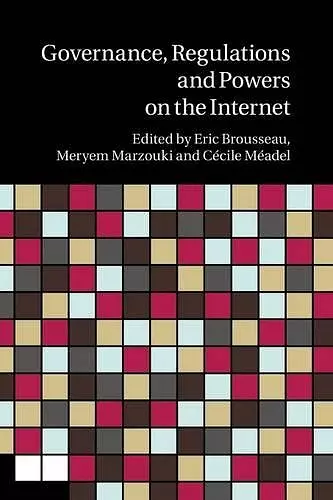Governance, Regulation and Powers on the Internet
Eric Brousseau editor Meryem Marzouki editor Cécile Méadel editor
Format:Paperback
Publisher:Cambridge University Press
Published:5th Mar '15
Currently unavailable, and unfortunately no date known when it will be back
This paperback is available in another edition too:
- Hardback£125.00(9781107013421)

An interdisciplinary survey of the issues surrounding the governance of the Internet.
Digital technologies have prompted the emergence of new modes of regulation and governance. This book brings together an international team of scholars to explain how collective regulations evolve in the broader context of the development of post-modern societies, globalization, the reshaping of international relations and the profound transformations of nation-states.Digital technologies have prompted the emergence of new modes of regulation and governance, since they allow for more decentralized processes of elaboration and implementation of norms. Moreover, the Internet has been raising a wide set of governance issues since it affects many domains, such as individual rights, public liberties, property rights, economic competition, market regulation, conflict management, security and the sovereignty of states. There is therefore a need to understand how technical, political, economic and social norms are articulated, as well as to understand who the main actors of this process of transformation are, how they interact and how these changes may influence international rulings. This book brings together an international team of scholars to explain and analyse how collective regulations evolve in the broader context of the development of post-modern societies, globalization, the reshaping of international relations and the profound transformations of nation-states.
'The internet is the ultimate multinational non-governmental organization. In its brief life it has become an integral part of most of our lives. Yet it is governed by a mixture of different competing organizations all lobbied by groups with very different goals. Privacy; free speech; intellectual property - all of these interests are fighting over how the internet will be governed - and who will be allowed to speak to whom about what. This book lays out the different organizations, issues, and competing interests and is essential reading for anyone who wants to come to grips with what will likely be the key issue in the first half [of] the twenty-first century.' David K. Levine, John H. Biggs Distinguished Professor, Washington University, St Louis
'A remarkable book that addresses from a truly global perspective the profound transformations on governance models and modes that are underway thanks to internet technologies, online communities and international communications. The editors have assembled a brilliant group of leading thinkers from different countries and disciplines to confront the task. Together, they explore in an insightful and coherent way a new vision for the relationship between information technologies and social and political change. The work combines theory, empirical research and practical approaches to make it an essential read for academics, policy-makers, stakeholders and decision-makers concerned with governance and the internet. A magnificent contribution to our understanding of the information society and an outstanding achievement.' Joel R. Reidenberg, Stanley D. and Nikki Waxberg Chair, Fordham University School of Law
'An impressive collection of essays on the state-of-art of Internet governance that provides invaluable insights into how the governance debate is shaped - by actors, institutions, structures, and discourse. Highly recommended for everyone desiring an in-depth understanding of Internet governance research!' Viktor Mayer-Schoenberger, Oxford Internet Institute, University of Oxford
ISBN: 9781107502611
Dimensions: 230mm x 153mm x 25mm
Weight: 660g
462 pages